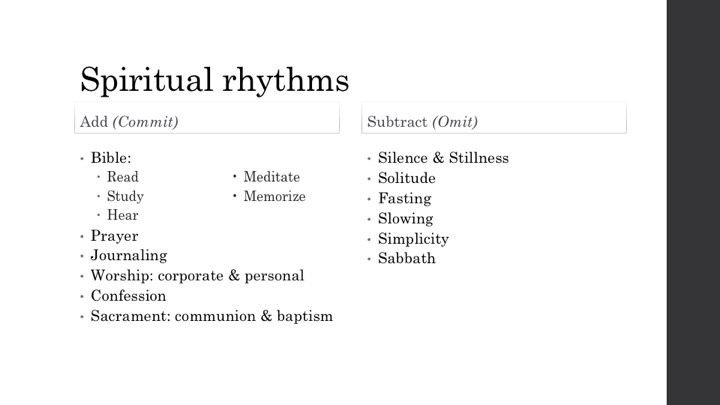
Photo copyright 2011-2015 by Randall J. Ehle
Rock music was part of my teen world. In those days before earbuds were ubiquitous, I would sometimes pull the stereo speakers down from the shelves, place them on the floor facing each other, and lay with my head between them while Led Zeppelin or the Eagles pumped into my ears like an IV. The same music filled my head on Sunday mornings, too, while I was getting dressed for church…until, that is, my dad would ask me to turn it down or even off, replacing my selections with Bach, Beethoven, or whatever he had in the way of Christian music. His reasoning: we need to prepare our hearts for worship. I grumbled about the change then, with the same type of argument my kids give me today.
As parents ourselves now, my wife and I have one-upped my own parents and talked about how preparing for worship needs to begin on Saturday nights, not just Sunday mornings. Sometimes those preparations are practical, like laying out clothes for the next day; sometimes they’re mental or even spiritual in nature—after all, how well does watching Braveheart prepare my mind to hear from God? But preparing to worship is not only about music and movies and clothes. It is about my heart, my mind, my soul… this is starting to sound like something God said on more than one occasion, and saw fit to write down for us:
“And you shall love the Lord your God with all your heart and with all your soul and with all your mind and with all your strength.” —Mark 12:30
In fact, this command is repeated several times throughout the Bible and, for Jews, has been a centerpiece of twice-daily prayers for thousands of years. It’s also a good guide to preparing for worship. Here are some thoughts on how to do that:
Heart: Think of the heart as the seat of our emotions. We can prepare to worship God by keeping our emotions and relationships in check. This might be as simple as a pleasant morning greeting or a hug and kiss for our family members, or as difficult as intentionally avoiding a relational conflict about clothes! (That’s one reason setting out clothes on Saturday night can help so much on Sunday morning.)
Soul: The soul represents what we most often think of as the spiritual. We can point our soul toward God by listening to God-focused worship music—as my dad exhorted—or by reading a devotional book or the Bible (especially some of the Psalms). The discipline of silence is also helpful; not just refraining from speech, but blocking out the noise around. I know what you’re thinking: “But I’ve got three kids under age six—where am I supposed to find silence?!” Be creative in location and brief in duration. You may not find silence on the couch, but bathrooms—even the shower—are usually good alternatives. And if you’ve never intentionally sat silently before, then you’ll find that even thirty seconds seems long…and can do wonders.
Mind: Reading the Bible can focus the mind as well as the soul, though this is a different type of reading. If you can find out ahead of time what passage the sermon will be focused on, read that. Or if your pastor sends an email or newsletter during the week, read that. These can get your mind pointed in the direction the message will soon be taking it.
Strength: Loving God with your strength isn’t about doing push ups in the morning (though that may be good for you, too). Rather, it is about preparing your body to worship Him. That can mean anything from the clothes you wear to the breakfast you eat to the sleep you get on Saturday night. Setting out clothes the night before—especially for kids or indecisive dressers—can reduce worship-inhibiting morning stress.
All of this can be challenging enough when you’re single; add a spouse and any number of kids—from infant to teenager—and it becomes exponentially more difficult. My wife and I, for example, have opposite ways of getting ready to go to church on Sunday mornings: she prefers to wake up leisurely and relax with a cup of coffee as she slowly dresses and does makeup, then rush the drive to church. I’d rather quickly get myself all ready to leave so I can relax for ten or fifteen minutes before we get in the car, then drive casually, and have plenty of time to find parking and seats before the service starts.
Here’s the rub: going to church is easy. Preparing to worship the Creator of the universe, though, takes forethought and planning… and that can’t happen on Sunday morning. Sometime this week, take time to think through and write down how you can best prepare for worship. Include each of these areas—heart, mind, soul, and strength (body)—noting what is needed in each and what time constraints there may be. If you’re married, do this together; if you have kids, share it with them (or better yet, work with them on it). Here’s a quick sample, assuming your church service starts at 9:00am.
Saturday evening: after dinner, everyone sets out clothes—right down to underwear, socks, shoes, and jackets—and gets appropriate approvals (from mom, dad, husband, wife). Iron what needs to be ironed. Do something fun together as a family, like a board game, puzzle, or fun G or PG movie that ends by 8:30.
Sunday morning: everyone is up in time for showers, breakfast, and coffee. Get dressed, put on makeup. Mom helps younger kids with hair; Dad helps them get dressed while Mom does her makeup. Aim for everyone to be dressed, hair combed and teeth brushed, and ready to leave fifteen minutes before departure time. Relax. Be quiet. Read. Listen to worship, praise, or instrumental music. Finish coffee. Five minutes before you have to leave, get out the door.
A word of caution: this isn’t simply about having a preset morning schedule; it may mean changing your perspective on things. It may mean that the time nazi who’s always watching the clock needs to chill out, and the one who has no concept of time needs to gracefully receive reminders. And as far as time is concerned, keep in mind that this isn’t about “being on time for church,” it is about preparing to encounter and worship God—and in that worship, we get to bless God.


